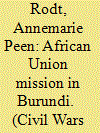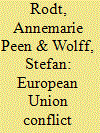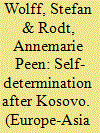| Srl | Item |
| 1 |
ID:
114740


|
|
|
|
|
| Publication |
2012.
|
| Summary/Abstract |
In 2002, the African Union (AU) was established to promote peace, security and stability on the continent. Since then, it has launched military operations to help regulate conflicts in Burundi, Comoros, Sudan and Somalia. This contribution evaluates the African Mission in Burundi (AMIB). It explores the AU's nascent approach to peacekeeping and investigates the relationship between its aspiration, experience and prospect of providing 'African solutions to African problems' in the security realm. The AMIB case study suggests that both the intervener's capabilities and the conflict context in which it operates affect its success. How these two categories relate to each other also matters. Different actors affect both internal and external contextual conditions. More support from one actor can compensate for less support from another. During AMIB, South African commitments made up for limited resources on part of the AU, its member states and institutions as well as insufficient interest from international donors.
|
|
|
|
|
|
|
|
|
|
|
|
|
|
|
|
| 2 |
ID:
114742


|
|
|
|
|
| Publication |
2012.
|
| Summary/Abstract |
Following a brief overview of the European Union's (EU) conflict management 'history', this article discusses the evolution of EU capabilities throughout the Union's involvement in the Western Balkans since the early 1990s. This is followed by a detailed case study of the EU intervention in Macedonia - Operation Concordia - and the contextual factors of that conflict, which shaped the outcomes of the EU's military efforts there. We conclude from this that the EU, alongside its partners in and beyond Macedonia, successfully prevented a likely civil war in the country in 2001, because the Union had a clearly defined set of interests, shared across institutions and member states, and interests that matched those of the main political players in Macedonia. This translated into sufficient political will to deploy sufficient military capabilities suited to the context of conflict management in Macedonia. However, we remain cautious as to whether the Union can muster similar levels of political will as well as the necessary capabilities to achieve the same elsewhere in the world.
|
|
|
|
|
|
|
|
|
|
|
|
|
|
|
|
| 3 |
ID:
122774


|
|
|
|
|
| Publication |
2013.
|
| Summary/Abstract |
This article discusses the meaning of self-determination in its historical and contemporary contexts and examines the different options available for the accommodation of contested self-determination claims. Among these, the creation of a new state, arguably, is the most radical of options and one that has significant regional and global implications beyond the territory to which it is applied. Detailing these implications in relation to the case of Kosovo, we make a broader argument that, even if secession is one mechanism to resolve self-determination disputes, this does not do away with the need to continue exploring settlements short of secession as alternatives to changing established international boundaries.
|
|
|
|
|
|
|
|
|
|
|
|
|
|
|
|
| 4 |
ID:
122761


|
|
|
|
|
| Publication |
2013.
|
| Summary/Abstract |
This special section examines the Comprehensive Peace Agreement (CPA) between the Government of the Republic of the Sudan and the Sudan People's Liberation Movement/Army. It focuses on why the agreement was possible, the challenges involved in reaching and implementing it, and the issues that now lay ahead for both North and South Sudan. The purpose of this undertaking is to tease out what lessons might be learnt from this case for the future study and practice of seeking to settle civil wars through agreement and implementation of conflict settlements. This introductory article first provides a brief summary of the Sudanese civil war; it then examines the CPA's power and wealth-sharing arrangements and their implementation to date; and finally concludes with an analysis of statebuilding in the recently independent South Sudan.
|
|
|
|
|
|
|
|
|
|
|
|
|
|
|
|